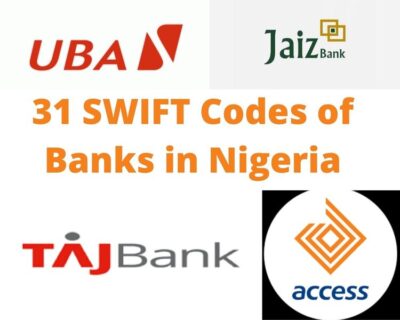What is a SWIFT Code?
A swift code is an 8 or 11-digit code or characters associated with a financial institution for making international transactions.
SWIFT code is a standard format for Business Identifier Codes (BIC) which is used to identify banks and financial institutions globally. It says who and where they are — a sort of international bank code or ID.
Every bank around the world has its own unique code which it must use when making wire transfer to another country. However, some banks have more than one SWIFT code and there are guidelines for using them.
For instance, the Bank of America has two primary SWIFT Codes:
- 1) BOFAUS3N is for customers who want to make a transfer in US dollars or an unknown currency). BOFAUS3N is associated with NA 222 Broadway New York, New York 10038.
- BOFAUS6S is dedicated for foreign currency with the address NA 555 California St San Francisco, CA 94104.
The bank specifically states that if customers do not know or unsure of the currency, then the code BOFAUS3N should apply.
Just as it is all over the world, financial institutions in Nigeria also have SWIFT codes to receive payment from abroad. For instance, ZEIBNGLA is for Zenith Bank Nigeria.
Apart from using the codes for international wire transfers or SEPA payments, banks also use these codes to exchange messages or communicate with each other.
Why do I need a SWIFT code?
As the recipient
The bank BIC or SWIFT code is important to receive payment. You’ll need to give this code including the details of your bank to anyone sending money to you from overseas.
The process may be slow and expensive than other financial services providers such as Wise, PayPal, Payoneer.
As the sender
If you’re sending money to someone overseas you’ll need to get the recipient’s SWIFT code in order to complete a transaction. Without it, cross-border can’t be done except you want to use PayPal and Payoneer.
Different country, different name, the same purpose
SWIFT codes and BIC codes are the same things and the terms are interchangeable. Other terms used by banks overseas include:
- CHIPS (Clearing House Inter-Bank Payment System) – US and Canada only
- NCC (National Clearing Code)
- BSC (Bank Sort Code) use by banks in England, Scotland, Wales, and Northern Island
- IFSC (Indian Financial System Code).
Understanding SWIFT Code
Sample: ZEIBNGLA
First 4 characters – bank code (only letters) ZEIB means Zenith Bank
Next 2 characters – ISO 3166-1 alpha-2 country code (only letters) NG stands for Nigeria. This is because Zenith bank’s swift number in Ghana is different from its headquarters in Nigeria.
Next 2 characters – location code (letters and digits) LA stands for Lagos, where Zenith’s headquarters is located.
What is a sort code?
A bank sort code is an 11-digit mixture of characters and numbers for local transactions among banking institutions.
Sort code is used locally to trace the origin of the branch where a transaction is initiated.
In Nigeria, for instance, banking customers may not necessarily need a sort code to make transactions, but when a huge amount is involved or there is a need to track the origin of payment, a sort code may suffice.
It’s also very important to point out that every branch of the bank has a unique sort code. For instance, if bank A has 2004 branches spread across the country, each of the branches will have their unique 11-digit sort code
In Nigeria, the first three-digit of the sort code identifies the bank itself while the rest identifies the branch.
Simply put, “sort codes are encoded into IBANs, but are not encoded into BIC codes,” Wikipedia
This means that the Ile-Ife sort code will be different from the Osogbo sort code. You can’t use Osogbo’s for Ikeja’s.
Why Sort Codes?
You will need your bank sort code if you want to receive international transactions, and resolve some issues locally. It varies from bank to bank.
When filling out form to receive international payment, you will be required to fill in your bank’s sort and SWIFT codes. In this case, you would fill in the sort code of where your bank is domiciled i.e where the bank account was set up.
Last 3 characters – branch code, optional (‘XXX’ for primary office) (letters and digits)
The Difference Between SWIFT and Sort Codes
SWIFT and Sort codes may be confusing to some people. Even though they are both used for financial transactions when making international and local payments, they have different structures and usage:
Geographic scope: SWIFT codes are majorly used for international transactions and have universal usage. But sort codes are geography-specific, but some global firms may request to know the specific branch of where an account is domiciled.
Length: SWIFT codes are longer; a combination of letters and numbers, making them unique for each financial institution wile sort codes may be shorter and consist of only numbers.
Usage: SWIFT codes are used for different international financial activities, including wire transfers and receiving funds from abroad. But sort codes, particularly in the United Kingdom are used for local transactions such as direct debits, interbank transfers, and payments to local recipients.
Similarities between SWIFT Code and Sort Code
- Both codes are associated with banking and financial transactions.
- Both codes can be used to verify the origin of a payment, including country and branch

